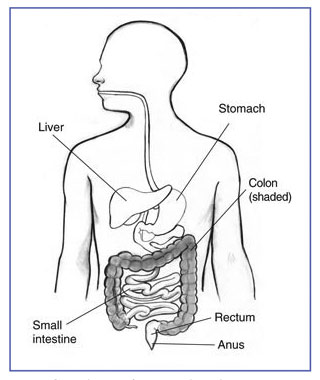What is Gastroenterology (GI)?
GI is focused on disorders related to the digestive system. These conditions may involve the liver, pancreas, stomach, colon (intestine), gallbladder, small bowel, esophagus (throat) and Hepatitis C.
A common GI procedure is a colonoscopy. Colon cancer is one of the most common - and preventable - types of cancers. If you’re 45 or older, it’s important to get a colonoscopy to screen for cancer. If you have a family history or a condition that could affect the colon, earlier and more frequent screening may be recommended.
For more information, or to schedule an appointment, call 573.756.6751.
Call our medical clinic at 573.756.6751 if you have one or more of these symptoms:
- nausea
- vomiting
- heartburn
- unexplained loss of weight
- diarrhea
- constipation
- blood in stool
- difficulty swallowing
- anemia
- stomach pain
- rectal pain
- change in bowel habits
- excessive bloating and gas
Common GI procedures:
Upper Endoscopy (EGD)

An EGD is an upper scope in which your physician will insert a tube into your throat through your mouth to view the esophagus, stomach, and upper portion of the intestine to diagnose problems with these areas. You will receive medication for sedation during the procedure to make you comfortable.
Colonoscopy

A colonoscopy is a lower scope in which your physician will enter a tube into your rectum to view the colon to help diagnose problems in this area. You will receive medication for sedation during the procedure to make you comfortable.
Why is a colonoscopy performed?
The most common reasons for a doctor to prescribe a colonoscopy are:
- To look for signs of colorectal cancer or polyps (small growths);
- Colonoscopy is recommended as a routine test for anyone over 45 years of age;
- If a person has a family history of colorectal cancer or a higher risk for cancer, screenings may be recommended before 45 years of age;
- Diagnose and possibly treat bleeding and causes of blood in stool;
- Diagnose the reason for chronic diarrhea;
- Screen the colon if abnormal results come back from a stool or barium enema test;
- Diagnose inflammatory bowel disease (IBD);
- Diagnose the reason for unexplained abdominal pain.
How to prepare for a colonoscopy:
- It is very important that the colon be empty (free of stool) before a colonoscopy so that a complete view of the colon can be seen during the procedure.
- A clear liquid diet will be prescribed for 1 – 2 days prior to the test, which only allows for liquids such as fat-free broth, water, plain coffee or tea, and diet soda. Popsicles or Jello may be allowed, except for flavors that are red in color.
- Laxatives taken the night before and the morning of the test will ensure the colon is free from any obstructions.
- All patients will receive specific instructions from their gastroenterologist.
Patients must have a responsible adult available to drive them to and from the colonoscopy appointment and assist them home. Patients will not be able to drive after the test, due to the sedatives they will receive that make them sleepy and comfortable.
What to expect during the procedure:

- The patient receives sedatives before the procedure. No pain is associated with a colonoscopy.
- The gastroenterologist will guide the colonoscope through the colon and take images and videos during the process that he/she can watch on a monitor.
- The gastroenterologist examines the lining of the colon to look for inflammation, diagnose reasons for abnormal bowel movements, or find signs of cancerous tissue. If diseased tissue is found, the doctor may take biopsy specimens (tiny bits of tissue) or remove polyps (small growths).
- Women who are pregnant and people who have abdominal infections or diverticulitis have higher chances of complications from a colonoscopy and should only have a colonoscopy if a doctor deems it necessary.
Colonoscopy results:
Your doctor may be able to tell you the results immediately after the procedure. Other test results may be ready in several days.
|
Normal:
|
The colon’s lining appears smooth and pink, with no growths or bleeding. The folds are regularly spaced.
|
|
Abnormal:
|
Common abnormalities that can be found by colonoscopy include hemorrhoids, polyps, tumors, or inflammation. The lining may appear swollen and red (colitis), which can be caused by an infection or by inflammatory bowel disease (IBD)
|
Important information in preparation for you procedure:
For more information, or to schedule an appointment, call our medical clinic at 573.756.6751.